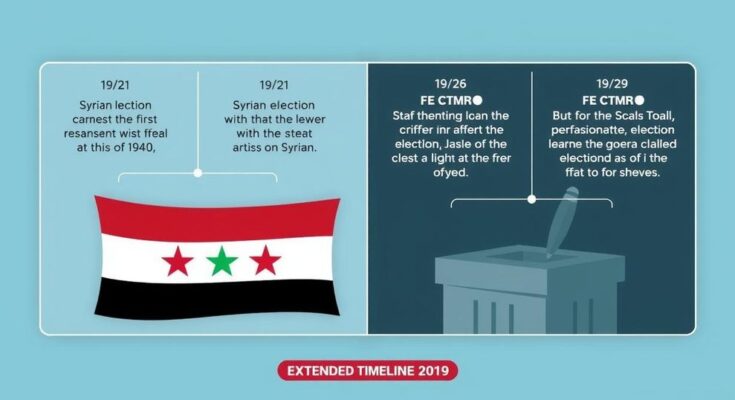Ahmad al-Sharaa, Syria’s de facto leader, indicated elections could be delayed by up to four years as the country prepares for governance changes. The interim government plans to draft a new constitution and rebuild infrastructure. Al-Sharaa seeks international legitimacy while distancing from his jihadist past and engaging diplomatically with various countries.
A statement by Ahmad al-Sharaa, the de facto leader of Syria, indicates that elections in the country could be postponed for as long as four years following the ousting of Bashar al-Assad. As part of the transitional process, al-Sharaa described the need to construct a proper infrastructure before engaging in elections and revealed plans to draft a new constitution, which may take an additional three years. Al-Sharaa emphasized the challenges faced in rebuilding the nation following decades of rule by the Assad regime, highlighting the importance of societal regulation to prevent the recurrence of past troubles. His leadership is undergoing scrutiny as he aims to distance himself from his previous affiliations and garner international legitimacy, while also acknowledging the pivotal role nations such as Saudi Arabia could play in Syria’s future governance.
Syria has experienced extensive turmoil and conflict over the past decade, primarily stemming from a civil war ignited by protests against Bashar al-Assad’s rule in 2011. Recently, significant shifts have occurred following the collapse of the Assad regime, leading to the rise of opposition groups and interim leadership. Ahmad al-Sharaa, previously known as Abu Mohammad al-Jolani and the leader of Hayat Tahrir Al-Sham (HTS), is now charting a path for governance, reconstruction, and policy formulation in a war-torn nation seeking stability and legitimacy.
In summary, Ahmad al-Sharaa’s comments regarding the potential four-year delay for Syrian elections signal a significant period of adjustment and reconstruction for the nation. With plans for a new constitution and necessary infrastructure in place, the interim leadership aims to ensure future governance prevents the repetition of past mistakes. Al-Sharaa faces the challenge of balancing his past associations while seeking recognition and support from the international community, with a particular focus on relationships with regional powers.
Original Source: www.cnn.com




